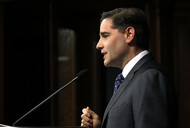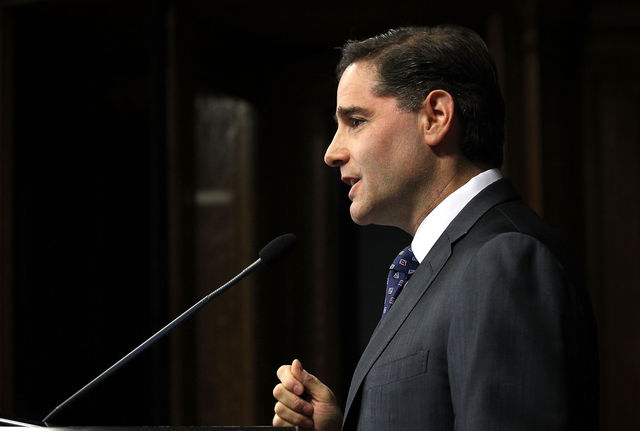All:
The battle is joined:
Google Vision Opposes AT&T as U.S. Looks to Sell Spectrum
By Todd Shields - Jan 22, 2013 11:00 PM CT
U.S. regulators preparing to auction airwaves craved by wireless providers to meet demand from data- hungry smartphones are facing a divisive choice: how much to devote instead to mobile
service that can be free.
Federal Communications Commission Chairman
Julius Genachowski, a Democrat who has pushed for broader access to high-speed Internet, backs a vision shared by
Google Inc. (GOOG) and
Microsoft Corp. (MSFT) of setting aside spectrum for mobile services not yet invented. He’s accused opponents of waging a “nascent
war on Wi-Fi,” the aerial Internet connection found globally in coffee shops and offices.
Federal Communications Commission Chairman Julius Genachowski, a Democrat who has pushed for broader access to high-speed Internet, backs a vision shared by Google Inc. and Microsoft Corp.
of setting aside spectrum for mobile services not yet invented. Photo: Alex Wong/Getty Images
Federal Communications Commission Chairman Julius Genachowski, a Democrat who has pushed for broader access to high-speed Internet, backs a vision shared by Google Inc. and Microsoft
Corp. of setting aside spectrum for mobile services not yet invented. Photo: Alex Wong/Getty Images
Airwaves withheld from the auction and allocated to new uses would mean fewer frequencies for established carriers such as
AT&T Inc. (T), whose largest effort to add spectrum was quashed in 2011 when the FCC objected to its proposed acquisition of T- Mobile
USA Inc.
“The largest holders of spectrum have no interest in seeing new competition,” Cathy Sloan, vice president of government relations with the Computer & Communications Industry Association,
said in an interview. Members of the Washington- based trade group include Google, Microsoft, biggest social network operator
Facebook Inc. (FB) and Internet radio provider
Pandora Inc. (P)
Carriers straining to meet growing demand from smartphones and tablets want as many airwaves as possible, Jot Carpenter, vice president of government affairs for CTIA-The Wireless Association,
said in an interview.
Television Frequencies
“Let’s find a way to maximize the amount of reclaimed spectrum that’s devoted to licensed operations,” or carriers operating under FCC imprimatur, Carpenter said. Members of the Washington-based
trade group include AT&T, Verizon, T-Mobile and
Sprint Nextel Corp. (S), which together serve almost nine in 10 U.S. wireless subscribers, according to data compiled by Bloomberg.
The debate is part of a broader discussion at the FCC about rules for divvying airwaves during the auction next year of frequencies now used by television stations. Station owners that
opt to participate will be assigned new frequencies.
The FCC in September voted unanimously to begin crafting auction rules, and Genachowski’s proposal for unlicensed or Wi- Fi use was part of that package.
“This is about the wireless companies trying to wrest spectrum from the broadcasters,”
Gigi Sohn, president of the Washington-based advocacy group
Public Knowledge, said in an interview. The FCC is trying to set rules so broadcasters offer enough airwaves for mobile carriers, and so “that
at the end, some of that spectrum is being preserved for other uses,” Sohn said.
Winners, Losers
Bigger arguments are in store as the FCC decides how to conduct the auction, which may
generate $15.2 billion and is to provide $7 billion to help build a nationwide wireless network for public-safety officials.
The FCC would be allowed to bar particular companies from bidding on some blocks of airwaves, Representative
Henry Waxman, of
California, the senior Democrat on the Energy and Commerce Committee, told the House last year, according to the Congressional Record. The agency can
set a limit on airwaves acquisitions by any company, Waxman said.
Waxman spoke in opposition to remarks four days earlier by Representative
Fred Upton, the Michigan Republican who chairs the committee.
“The FCC should not be picking winners and losers,” Upton said, according to the Congressional Record. The agency can’t exclude qualified bidders, Upton said.
T-Mobile Rejection
The FCC under Genachowski has signaled a willingness to take on AT&T and Verizon, the two largest carriers with a combined 62 percent of U.S. wireless subscribers, according to Bloomberg
data.
Genachowski broke with Republican predecessors and declined to call the wireless market competitive, and he has said regulators’ quashing of No. 2 mobile company AT&T’s bid for fourth-largest
carrier T-Mobile eased a market that was “on the
doorstep of duopoly.”
Michael Balmoris, a Washington-based AT&T spokesman, didn’t return a telephone call and e-mail seeking comment. Ed McFadden, a Verizon spokesman in
Washington, declined to comment.
In an October speech, Genachowski cast those who oppose his push for more airwaves outside carriers’ control as being against “balanced spectrum policy.”
The FCC’s proposal for swaths devoted to Wi-Fi could cost the government as much as $19 billion in revenue if those airwaves bands aren’t sold at the auction, Representative Greg Walden,
an Oregon Republican, said at a hearing last month.
Campaign Money
“Their size should be minimized,” said Walden, chairman of the House communications and technology subcommittee.
The clash pits a Democratic-leaning high-technology industry against telecommunications companies whose employees trend Republican in campaign donations.
About 60 percent of computer- and Internet-industry employees’ political contributions went to Democrats during the 2012 elections, according to the Center for Responsive Politics, a
Washington-based research group that tracks campaign donations. That category is by led Microsoft, Google, InterSystems Corp.,
Oracle Corp. (ORCL) and
Intel Corp.
Telecommunications industry employees, on the other hand, gave 61 percent of their contributions to Republicans.
Largest search-engine owner Google, based in
Mountain View, California, and biggest software-maker Microsoft joined more than 300 companies and organizations in calling for more Wi-Fi. The
request came in a Dec. 10 letter to Walden and to Representative
Anna Eshoo of California, the top Democrat on the communications subcommittee, who represents Silicon Valley.
“If the commission does not designate more unlicensed spectrum, the fuel for this growth engine will be lost,” the companies said in the letter.
To contact the reporters on this story: Todd Shields in Washington at
tshields3@xxxxxxxxxxxxx.
To contact the editor responsible for this story: Bernard Kohn at
bkohn2@xxxxxxxxxxxxx.
Rich Kennedy
Standards Manager
Research In Motion Corporation
mobile: +1 (972) 207-3554
office: +1 (972) 910-3448
IEEE 802.11 TGaf Chair
IEEE 802.11 to 802.18 Liaison
IEEE 802.11 Regulatory Standing Committee Chair
Wi-Fi Alliance Spectrum & Regulatory Task Group Chair
"Success is going from failure to failure without losing enthusiasm" - Winston Churchill

